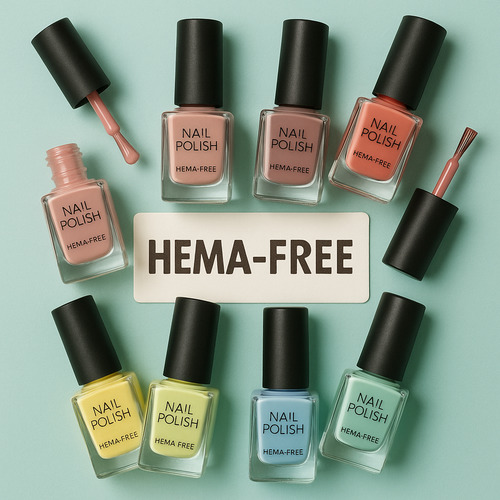Modern nail products are rapidly evolving, and more and more consumers are beginning to scrutinise the composition of the products they use for nail care. One of the most talked about ingredients in recent years has been HEMA, a popular ingredient in gels, gel varnishes and other nail enhancement products.
HEMA (hydroxyethyl methacrylate) is known for its ability to provide a strong and durable coating. However, there are more and more alarming questions about its safety: how harmful is it, what health risks can it carry, and is it really worth continuing to use it in manicures?
In this article, we'll take a closer look at what HEMA is, why it has become the subject of debate and what possible health implications exist.
HEMA (hydroxyethyl methacrylate) is known for its ability to provide a strong and durable coating. However, there are more and more alarming questions about its safety: how harmful is it, what health risks can it carry, and is it really worth continuing to use it in manicures?
In this article, we'll take a closer look at what HEMA is, why it has become the subject of debate and what possible health implications exist.
What is HEMA?
HEMA, short for Hydroxyethyl Methacrylate, is a liquid monomer widely used in the beauty industry, especially in gel lacquers, gels and acrylics. Due to its properties, it helps to create a strong, tacky layer on the nail surface, ensuring a stable and long-lasting manicure.
However, chemically, HEMA can easily penetrate the skin - especially if the skin barrier is damaged. This makes it potentially dangerous for people with sensitive skin or a tendency to allergic reactions.
With the rapid development of the nail industry and increasing consumer attention to the composition of cosmetic products, HEMA is increasingly at the centre of the debate. Despite its important role in ensuring the strength and durability of coatings, it raises serious concerns about potential health risks.
What are the health effects
Although HEMA is not banned in Europe, its use is strictly regulated. This is because it can cause serious side effects at high concentrations or with prolonged and frequent exposure. This is especially true for nail technicians and people who regularly use products containing HEMA.
The main risks of using HEMA products are:
- Contact allergy - manifested as redness, burning and even a burning sensation.
- Contact dermatitis - an inflammatory skin reaction in response to contact with an allergen.
- Tingling and tingling - unpleasant sensations in the area of the nails and the skin around them.
- Permanent sensitisation - after developing an allergy to HEMA, the body remains hypersensitive and the reaction does not go away over time.
It is important to bear in mind that such reactions can occur even without direct skin contact due to volatile substances or use in inappropriate conditions, such as working with poor quality UV lamps or insufficient ventilation.Against the backdrop of the rapid development of the nail industry and growing consumer attention to the composition of cosmetic products, the HEMA component is increasingly at the centre of discussions. Despite its important role in ensuring the strength and durability of the coating, it raises serious concerns about potential health risks.
Why choose HEMA-free nail products?
If you're not only aiming for a long-lasting manicure, but you're also concerned about the health of your skin, avoiding products with HEMA is an informed and wise choice. Here are a few important reasons why you should choose HEMA-free manicure products:
1. Safety for skin and nails
HEMA-free products significantly reduce the likelihood of allergic reactions and irritations, making them an ideal choice for people with sensitive skin or those suffering from dermatitis.
2. Protection for nail technicians
Using products with HEMA in everyday procedures can increase health risks. By choosing professional products without HEMA, you are not only concerned about safety, but you are also providing reliable protection for both your health and your client's health.
3. The modern alternative is just as effective
Modern HEMA-free formulas provide the same durability and professional results, while not harming the health of users.
4. Keeping up with today's beauty trends
In 2025, sustainability, safety and ethical practices in the beauty industry take on a special importance. Consciously choosing products without controversial ingredients is becoming an integral part of today's lifestyle, reflecting care for ourselves and the environment.

